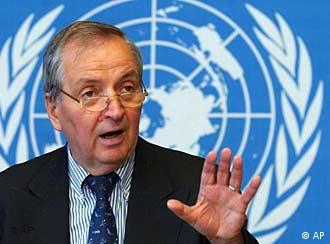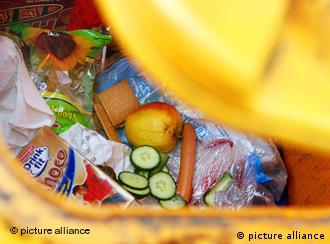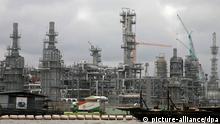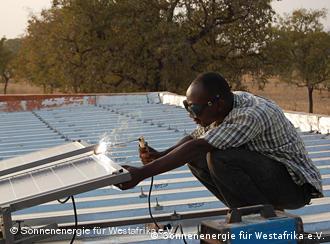Environment expert Klaus Töpfer says that societies cannot continue to live at the cost of future generations. He believes it's important to change world trade structures to help poor countries, while reducing emissions.
Prof. Klaus Töpfer is an economist and former German environment minister. He headed the United Nations Environment Program, UNEP between 1998 and 2004. He is currently the executive director of the Potsdam Institute for Advanced Sustainability Studies, IASS.
DW: Mr. Töpfer, 20 years after the Agenda 21 agreement in Rio de Janeiro, the world community is meeting once again to take stock of our current situation. What has changed in the past two decades?
We entered these two decades with great euphoria. I myself did back then in Rio. We were able to make important decisions. But there was one thing we didn't think about: what mechanisms to decide on, too, so that the lofty goals that we set could be implemented.
There were a lot of loose ends. We didn't accomplish a lot of goals we had set, not by a long shot, namely avoiding yet another gap between countries in the North and South and overcoming poverty and hunger.

As former executive director of the UN Environment Program Töpfer has been involved in international discussions
It hasn't been achieved. And that's why 20 years later, we're not trying to look backwards, but trying to decide on what we didn't decide back then: the implementation, the instruments—that's a method, that's the financial situation, cooperation beyond borders. It has to be decided now.
What has to change in order to arrive at real sustainable development?
The first important thing is that we need a different approach to the world trade structures. The World Trade Organization hasn't made progress there, it still needs to be taken care of. And it the less developed countries who suffer most from this problem.
Secondly, we have to think about the fact that we're growing into a world inhabited by 9 or 10 billion people.
How can we succeed in making it possible for them to be able to live peacefully and without hardship?
It all starts with us. Every year we throw away a few million tons of food. We're living a lifestyle that really is not sustainable, and that is setting an example for others. So we must change how we're living.

Tons of food are thrown away, while more than a billion people don't have enough to eat
That's also a question of our financial commitment, our investment in the future. If we can't get rid of this big difference between rich and poor, the consequences will be are disputes and violent conflicts. So what to do: we need a global peace policy.
What does sustainable development mean for industrial nations of the north whose economy is dependent on raw materials and based in growth?
Up until now it's all been decided on a short-term basis. We've put a lot of the costs of prosperity on our tab and suddenly have noticed that we have to pay up. We have changed the climate for the sake of prosperity, we have overstrained the environment, we have diminished biodiversity.
All of these burdens for the sake of future development. We know that we've done the same thing in the financial sector. We live at the expense of others. We subsidize our prosperity. So, now we should include the consequences in the initial costs! Now it needs to be made clear that we can't put more CO2 into the environment for free, which we still do to a large extent.
We can't just pass our own problems off to others, including future generations. That's a concrete task for every single person. And this goes straight to the question, wasn't it absolutely necessary to get away from our old energy model that was already putting a huge burden onto future generations?

Experts think that global oil resources will be exploited within a few decades
The best example is nuclear energy. What would a new, global agreement look like that would open up realistic opportunities for development to the countries of the South?
It has to be a pact of solidarity, of mutual understanding that doesn't immediately point a finger at someone else, but instead asks what we need to do to contribute. Where do we find ourselves talking more about sustainability than actually implementing it? I believe that our transition to safer energy is a great example of this.
In Africa, people ask me a lot, when are you finally going to know enough about solar energy, so that we can get it, too? This is still too expensive for us. But there they have 3000 hours of sun annually. We have 900. So you see the development possibilities we could open to others by changing our own technology.
And energy is at the heart of the question. The same is true of raw materials. What can we do to use raw materials more efficiently, when are we going to close the loop? Don't we need to establish a circulatory economy and society?
Right now we're a society that throws stuff away. We have to change that. And that's where we'll notice that there's suddenly more space for other things, including our consumptions habits. We virtually “eat” energy. Our food production eats up a lot of energy. Someone once said, “We're eating oil". We're not aware of what we're doing.

Africa has a huge potential for solar energy production
Just now we're getting to the question, what is virtual water. For instance, how much water was used in order to produce my suit. A huge amount! And particularly in the regions where there are water shortages. So, you see, solidarity isn't a catch phrase over there, but it has to be put in concrete action right here.
Last year, the UN human rights council adopted the “guiding principles”, which puts trade in terms of human rights. What does this mean for German companies?
The binding force of every decision the UN makes depends on its members, that is to say on the member nations. But we know that in this case wide-reaching mechanisms are effective, also in an informal way. Take our situation. You can't call a company rational that believes that the standards we have here cannot be followed in India or elsewhere as well.
There is a quick journalistic instinct, and there is also the interest of people who go to these place in their holidays and come back and say “have you looked at what we're buying here?”
And that we already see in companies here : there is a delivery chain - each step in the process needs to be observed: is this done in a responsible way?
This process is not standardized. But it is psychologically quite effective that we have vigilant people who ask, how much do I consume, where is it from, how was it produced, what environmental problems are connected with it.
Our growing awareness comes through in other ways, too, like through having things like fair trade. And then of course we increasingly have the chance to create more transparency within the UN. How is each country behaving?
And In our world of information technology transparency is something that's very important. You wouldn't believe how much power is connected to the proper use of the internet.
Interview: Mirjam Gehrke / ks
Editor: Anke Rasper DW DE
Editor: Anke Rasper DW DE


No comments:
Post a Comment